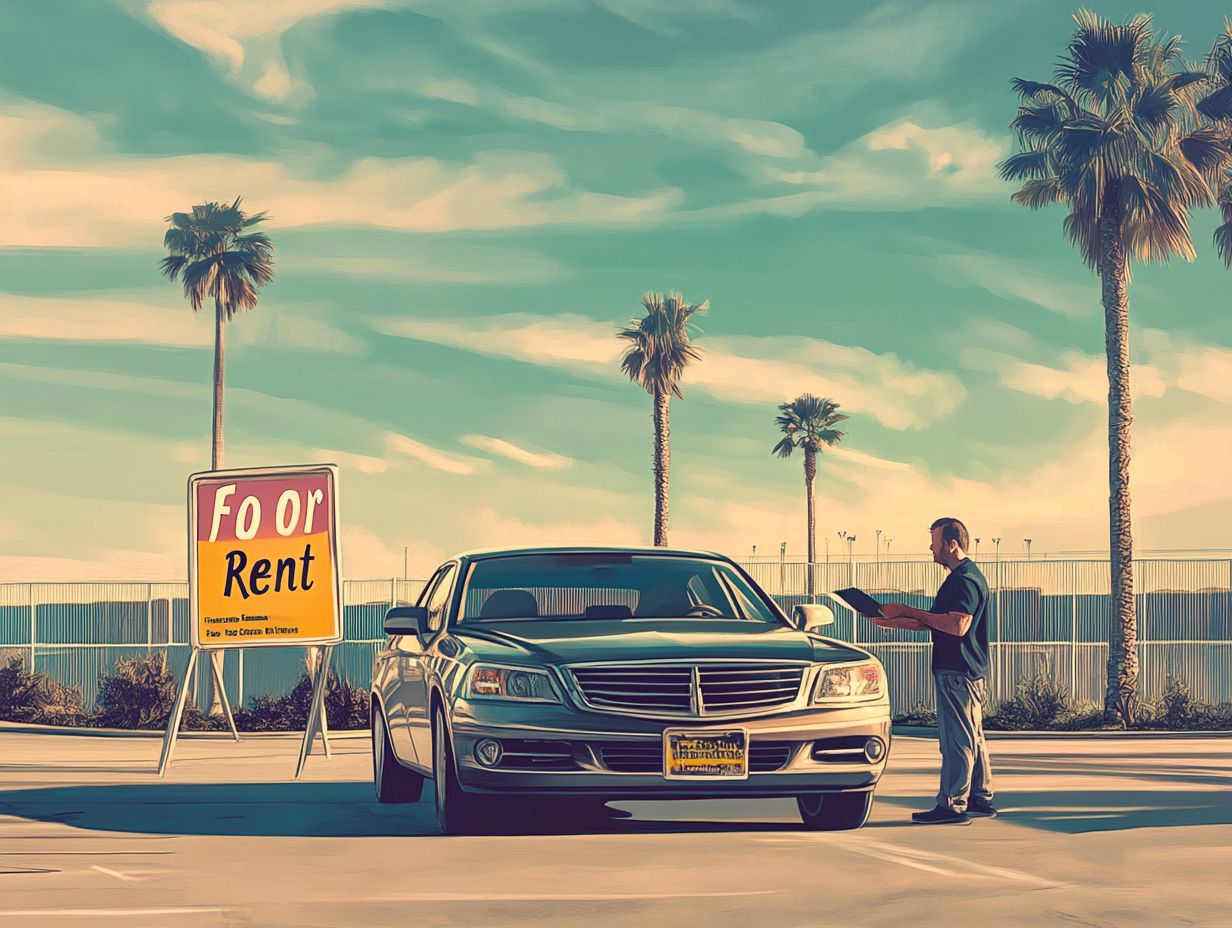Do You Need Insurance for a Rental Car?
Renting a car can feel overwhelming, especially when it comes to understanding insurance. However, knowing your insurance options is vital to protect yourself and your finances.
This article delves into the realm of rental car insurance, highlighting key types like Collision Damage Waiver and Supplemental Liability Insurance while clarifying when these options are necessary.
It also examines how your personal auto insurance and credit cards might come into play, along with savvy tips for saving on coverage costs.
By the end, you’ll possess the confidence to navigate the rental car insurance landscape with ease.
Contents
- Key Takeaways:
- Understanding Rental Car Insurance
- Types of Rental Car Insurance
- When You May Need Rental Car Insurance
- Factors to Consider Before Purchasing Rental Car Insurance
- Tips for Saving Money on Rental Car Insurance
- Frequently Asked Questions
- Do You Need Insurance for a Rental Car?
- What type of insurance do I need for a rental car?
- Can I use my personal car insurance for a rental car?
- What if I don’t have personal car insurance?
- Do I need insurance if I’m only renting the car for a short time?
- What happens if I decline insurance and get into an accident?
Key Takeaways:

- Rental car insurance may be necessary depending on your personal auto insurance coverage and credit card benefits, as well as the rental car company’s policies.
- It is important to compare the cost and coverage of rental car insurance with other options, such as your personal policy or credit card benefits, before making a decision.
- Consider alternative insurance options, such as third-party policies, to potentially save money on rental car insurance.
Understanding Rental Car Insurance
Understanding rental car insurance is crucial for anyone intending to rent a vehicle, as it safeguards you against unexpected expenses during your rental period. The specifics can vary considerably based on factors like your personal auto insurance policy, the rental car company s offerings, and even the coverage provided by your credit card.
This insurance typically includes several coverage options, such as collision damage waivers, liability coverage, and personal accident insurance. By familiarizing yourself with your options, you can make informed decisions that ensure you have adequate protection while keeping insurance costs in check.
What is Rental Car Insurance?
Rental car insurance is a valuable form of protection you can purchase to safeguard yourself against potential damages or liabilities while using a rental vehicle, granting you peace of mind during your travels.
This insurance typically encompasses various coverage options, all designed to shield you from substantial expenses resulting from accidents or theft.
Grasping the specifics of these components is vital, as they determine how claims are handled and which incidents are covered. Understanding your rental agreement is important! It clearly outlines how these protections work and what your responsibilities are.
Types of Rental Car Insurance
When you rent a vehicle, it’s essential to grasp the various types of rental car insurance at your disposal. This understanding ensures that you secure the right protection tailored to your needs, particularly when navigating unfamiliar driving conditions.
Collision Damage Waiver (CDW)
The Collision Damage Waiver (CDW) is an appealing option that shields you from financial liability should the rental vehicle sustain damage or be stolen during your rental period. This is insurance that covers damage to the rental car in case of an accident.
Essentially, if something unfortunate happens to the vehicle like damage or theft you might not be on the hook for the entire cost, which can be a tremendous relief. Typically, CDW covers repairs or replacement up to the vehicle’s value, though it often comes with its own set of limitations, such as exclusions for specific types of damage, normal wear and tear, or driving violations.
Without CDW, you could face high insurance costs or out-of-pocket expenses that could soar into the thousands, especially in the event of a high-speed collision. On the flip side, having CDW can bring you peace of mind, allowing you to concentrate on enjoying your travel plans instead of fretting over potential vehicle damage.
Supplemental Liability Insurance (SLI)

Supplemental Liability Insurance (SLI) offers an extra layer of liability coverage beyond what your personal auto insurance policy provides. It shields you from claims made by others if an accident occurs.
In today s world, where medical bills and vehicle repair costs can skyrocket, this additional protection is crucial. Knowing that SLI can bridge the lack of coverage gives you invaluable peace of mind, especially when navigating high-traffic areas.
Unlike minimum liability coverage, which barely meets legal requirements, SLI ensures you re well-protected against significant money issues from claims involving personal injury. For instance, if you’re in a collision where another driver suffers serious injuries, SLI could help cover compensation costs. This safeguards your assets and lets you focus on recovery rather than worrying about potential legal troubles.
Personal Accident Insurance (PAI)
Personal Accident Insurance (PAI) provides invaluable coverage for medical expenses if you have an accident while driving a rental vehicle. It protects both you and your passengers.
This essential insurance covers more than just hospital bills; it can really help during tough times. If you frequently rent vehicles or travel through high-risk areas, having PAI can ensure you remain financially secure, whether you re driving or riding as a passenger.
PAI often includes protection for your belongings that might be lost or damaged during an incident. It serves as a comprehensive safety net for all road users, giving you peace of mind on every journey.
When You May Need Rental Car Insurance
Understanding when to purchase rental car insurance is a smart financial decision. This can offer not only potential savings but also invaluable peace of mind, especially if your personal auto insurance doesn t extend to rental cars or if you re navigating unfamiliar territory.
Assessing Your Auto Insurance for Rental Cars
It s essential to understand your personal auto insurance coverage to determine if it adequately protects you when renting a vehicle. Many policies offer some form of coverage for rental cars, but not all are created equal.
You may be surprised to learn that while your personal auto insurance might extend liability coverage to rental vehicles, it often excludes certain damages, such as those from accidents or theft. This could leave you exposed in unexpected situations. Additionally, your auto insurance may not fully satisfy the rental car companies’ insurance requirements.
It s vital to check your coverage now to avoid unexpected costs later! Assess any potential gaps, such as collision or comprehensive protection, that could place you in a financially vulnerable position.
Exploring supplemental rental car insurance could be a smart move, especially if you frequently rent vehicles or drive in unfamiliar territories. Being prepared is always better than discovering too late that you re not as covered as you thought.
Credit Card Coverage
Many credit cards offer the enticing perk of rental car coverage, often extending protection for collision damage and theft. This can save you the hassle and expense of purchasing additional insurance from rental companies.
It’s essential to familiarize yourself with the specific terms tied to this coverage, as not all cards offer the same level of protection. Some may provide limited coverage, while others might include rental car reimbursement, easing financial strain if the vehicle becomes unusable.
Understanding the insurance requirements is crucial. Relying solely on your credit card’s coverage without reviewing the fine print could lead to unexpected costs or gaps in protection. Therefore, take the time to thoroughly review your card’s policy to ensure you have adequate coverage for your travel needs.
Factors to Consider Before Purchasing Rental Car Insurance

Before you purchase rental car insurance, it’s crucial to carefully consider several factors. Take into account the cost, coverage limits, and specific policies of the rental car company.
Doing so will enable you to make a well-informed decision that best suits your needs.
Cost and Coverage Comparison
Conducting a thorough cost and coverage comparison is essential for understanding the financial implications of rental car insurance options. This will help you find coverage that works for you.
By evaluating various insurance premiums, you can make informed choices about the level of protection necessary while driving a rental vehicle. Consider the benefits of comprehensive coverage versus the temptation of lower premiums, which may leave you exposed to unforeseen incidents.
Coverage options differ significantly in the protections they offer. Diving into the specifics is crucial to ensure you don t miss any critical elements. Ultimately, finding the right balance between affordability and sufficient coverage can grant you the peace of mind you desire during your travels.
Rental Car Company Policies
Rental car company policies on insurance can be quite a maze, making it important for you to read the fine print and fully grasp their insurance requirements. This will help you sidestep any unexpected charges.
With many rental car companies presenting various packages, you might feel overwhelmed with so many options available. Look deeply into each company s insurance options; what may seem like a fantastic deal at first glance could fall short in terms of adequate protection.
Many organizations offer common supplemental coverage options, such as Collision Damage Waivers (a type of insurance that covers damage to the rental car in case of an accident) and personal accident insurance, which can significantly influence your rental costs.
Customer service is invaluable in unraveling these complexities. Representatives need to effectively address your concerns, ensuring that every transaction is smooth and well-informed for you as the renter.
Tips for Saving Money on Rental Car Insurance
Discovering strategies to save on rental car insurance can significantly enhance your travel budget, enabling you to explore alternative insurance options that offer comparable coverage without breaking the bank.
Alternative Insurance Options
Exploring alternative insurance options, such as travel insurance, homeowners insurance, or renters insurance, can offer you additional protection for rental vehicles without the hassle of purchasing standalone rental car insurance.
This strategy is especially beneficial for those who travel frequently or already have existing policies that extend to rental coverage. For example, if you book a weekend getaway and have comprehensive travel insurance, you might discover that it covers collision damage and liability, effectively minimizing those extra charges at the rental counter.
Similarly, if you have homeowners or renters insurance, it may include provisions that protect against damage to a rented vehicle, potentially making it a more prudent financial decision. Act now to save money and ensure you have the coverage you need!
Frequently Asked Questions

Do You Need Insurance for a Rental Car?
Yes, it is highly recommended to have insurance for a rental car. Most rental car companies require some form of rental car insurance coverage before they will allow you to rent a vehicle.
What type of insurance do I need for a rental car?
The type of insurance you need for a rental car may vary depending on your personal insurance coverage and the rental car company’s policies. It’s best to check with your insurance provider and the rental car company to determine what type of coverage you need.
Can I use my personal car insurance for a rental car?
In some cases, your personal car insurance may cover you for a rental car. However, it’s important to check with your insurance provider to confirm this and to see if there are any limitations or restrictions on coverage.
What if I don’t have personal car insurance?
If you don’t have personal car insurance, you can buy coverage from the rental car company. While this option may cost more, it ensures you have the needed protection for the rental.
Do I need insurance if I’m only renting the car for a short time?
Yes, you need insurance even for short rentals. Accidents can occur unexpectedly, and insurance shields you from possible financial burdens.
What happens if I decline insurance and get into an accident?
If you decline insurance and have an accident, you will be liable for any damages or injuries. This could lead to high costs, so think carefully before refusing coverage!






